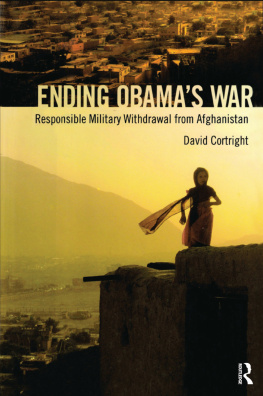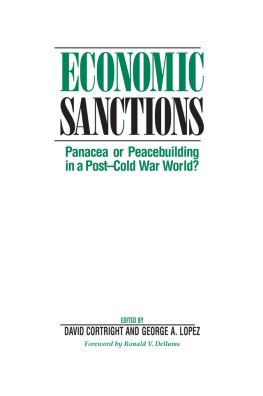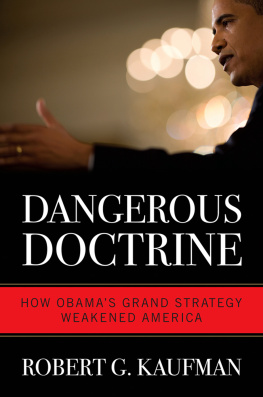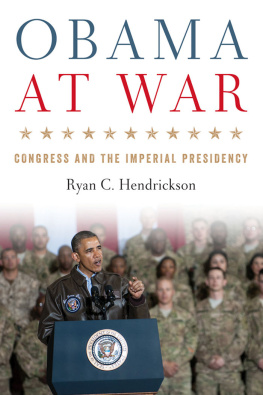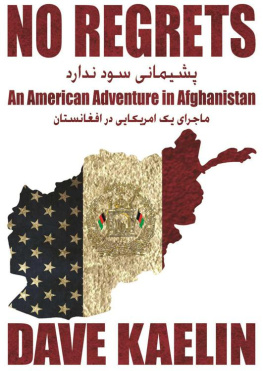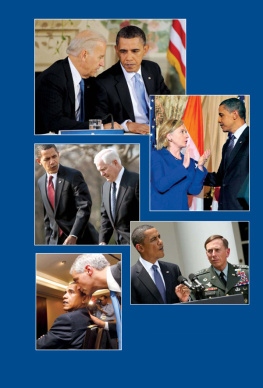ENDING OBAMAS WAR
ENDING OBAMAS WAR
RESPONSIBLE MILITARY WITHDRAWAL FROM AFGHANISTAN
David Cortright
First published 2011 by Paradigm Publishers
Published 2016 by Routledge
2 Park Square, Milton Park, Abingdon, Oxon OX14 4RN
711 Third Avenue, New York, NY 10017, USA
Routledge is an imprint of the Taylor & Francis Group, an informa business
Copyright 2011, Taylor & Francis.
All rights reserved. No part of this book may be reprinted or reproduced or utilised in any form or by any electronic, mechanical, or other means, now known or hereafter invented, including photocopying and recording, or in any information storage or retrieval system, without permission in writing from the publishers.
Notice:
Product or corporate names may be trademarks or registered trademarks, and are used only for identification and explanation without intent to infringe.
Library of Congress Cataloging-in-Publication Data
Cortright, David, 1946
Ending Obamas war : responsible military withdrawal from Afghanistan / David Cortright.
p. cm.
Includes bibliographical references and index.
ISBN 978-1-59451-984-0 (hardcover : alk. paper)
1. Afghan War, 2001Peace. 2. United StatesMilitary policy. 3. Disengagement (Military science) 4. Postwar reconstructionAfghanistan. 5. AfghanistanSocial conditions21st century. 6. WomenAfghanistanSocial conditions21st century. 7. National securityAfghanistan. I. Title.
DS371.412.C66 2011
958.1047dc22
2011008022
ISBN 13 : 978-1-59451-984-0 (hbk)
ISBN 13 : 978-1-59451-985-7 (pbk)
Designed and Typeset by Straight Creek Bookmakers.
Contents
With Sarah Smiles Persinger

T his book is the result of my personal journey to understand the complexities of the war in Afghanistan and how to bring it to an end in a responsible manner. It began as an attempt to evaluate the ethics of the war and evolved into a broader attempt to articulate an alternative course. For years I had remained silent about Afghanistan, focusing as many of us did on the war in Iraq. The Bush administrations invasion and occupation of Iraq were so obviously unjust that we had to speak out. The military campaign in Afghanistan seemed more ambiguous and therefore less objectionable. It was justified as a necessary fight to suppress al Qaeda and help the Afghan people, especially women, create a future free of Taliban extremism. The closer I looked at the Afghanistan War, however, and as President Obama sharply escalated U.S. military involvement, the more I began to question these assumptions. As my doubts and concerns multiplied, I embarked on an intensive study that led me to the observations and conclusions contained in this volume. Along with many others I recognized the need for an alternative policy, one that could end the war without making matters worse and help achieve a more just and secure future for the people of the region.
While this is my personal exploration, and I take full responsibility for any errors of fact or judgment that may be contained here, the book is very much a collective effort that has involved dozens of colleagues, friends, and associates. I am grateful to the Peace Research Institute of Oslo (PRIO) and the Aquinas Center at Ave Maria University in Naples, Florida, for inviting me to speak at the June 2009 conference Just War in the Catholic Tradition, and especially to Greg Reichberg, the principal organizer of the conference, for graciously accepting my request to write a paper applying just war ethical principles to the Afghanistan war. I also thank Henrik Syse at PRIO and Martin Cook, former professor of military ethics at the U.S. Air Force Academy, for reviewing an early version of the ethics portion of the manuscript.
I benefitted most in writing this book from my colleagues at the Kroc Institute for International Peace Studies at Notre Dame, especially Sarah Smiles Persinger and Eliot Fackler. Smiles Persinger helped to write and has been an invaluable ally in researching and writing about the gendered dimensions of the war. A former journalist for the Melbourne Age with several years of experience reporting in the Middle East, Smiles Persinger traveled to Kabul in April and May 2010 to research security and womens rights issues. A specialist in war and gender issues, she conducted more than fifty interviews with Afghan women leaders, including parliamentarians, activists, school principals, health workers, and members of the police force and army. Eliot Fackler is research assistant to the policy studies program at the Kroc Institute and has been an invaluable colleague in this and other research and writing projects at the Institute. He edited and researched every page and reference in this book and played an indispensable role in managing the production of the manuscript. This work would not have been possible without his enthusiastic professional support and assiduous attention to detail.
Support for this project also came from Hal Culbertson, executive director of the Kroc Institute, and Joan Fallon, the Institutes director of communications. Assisting with research were current and recent Kroc Institute MA students Takhmina Shokirova, Vanya Cucumanova, Lucia Tiscornia, and Shashi Rani Regmi. Colleagues at the University of Notre Dame who shared perspectives and insights include Dan Lindley, Mary Ellen OConnell, Peter Wallensteen, and Michael Desch. Duane Shank, senior policy advisor at Sojourners, read an early version of the manuscript and provided helpful comments and critiques. Also providing constructive suggestions and critiques was Bob Haywood, executive director of the One Earth Future Foundation. I received valuable insights and assistance from Alistair Millar and Linda Gerber-Stellingwerf of the Fourth Freedom Forum, and from Tom Andrews of the Win Without War coalition. I benefitted from an important briefing session and discussion at the Center for International Policy with Matt Hoh, Matt Waldman, Selig Harrison, Bill Goodfellow, and Gary Porter. Celeste Kennel Shank provided editing assistance.
Financial support for the research and writing of this manuscript came primarily from the Kroc Institute. I am deeply grateful to the Institutes director, Scott Appleby, for his support and encouragement of my work. The Dutch development agency Cordaid also provided assistance. We are very grateful for the support and encouragement of the Cordaid staff team, including Lia van Broekhoven, Paul van den Berg, Dewi Suralaga, and Fulco van Deventer.
I have spent most of my life working against war, from Vietnam to Iraq, but I am deeply torn about what should be done in Afghanistan. I recoil at the specter of a seemingly endless war, now in its tenth year, increasingly violent and destructive, with casualties rising and extremism spreading in the region and beyond. Yet military withdrawal could make matters worse if it leads to the return of the Taliban, handing victory to those who harbored al Qaeda on 9/11, and abandoning Afghan women to the tyranny of misogynist reactionaries. Is war the right strategy, though? We have battled the Taliban for more than nine years, yet they only seem to grow stronger and widen their influence. How can we succeed when our supposed allies in Kabul are unreliable and corrupt and in some cases espouse policies that differ little from those of the Taliban? Is this a struggle worthy of the sacrifices of our soldiers and the vast effort being poured in by dozens of countries?

